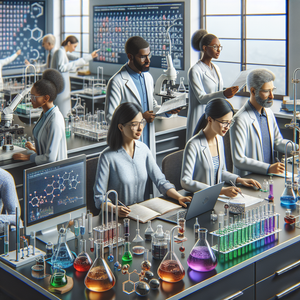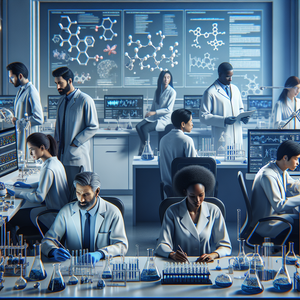
Exploring Career Opportunities in Chemistry: 20 Pathways for Aspiring Chemists
Chemistry, often referred to as the central science, encompasses the study of matter and its transformations across various domains. It is traditionally divided into five branches: organic, inorganic, analytical, physical, and biochemistry. Each branch offers distinct career paths, increasingly vital in a world that demands innovative solutions to challenges like healthcare advancements and environmental sustainability. This article highlights 20 career options available to aspiring chemists, detailing their roles, required qualifications, and the significance of these positions in today's society. By understanding these pathways, individuals can better navigate their career choices within this dynamic field.
Job Summaries:
Organic Chemist:
- Organic chemists focus on the synthesis and development of carbon-rich compounds.
- They play a key role in the pharmaceutical industry.
- An undergraduate degree in chemistry or a related field is necessary.
- Strong analytical thinking skills are important.
- Their work underpins advancements in drug design and materials science.
Analytical Chemist:
- Utilizing methods like chromatography and mass spectrometry, analytical chemists determine the composition of various substances.
- A bachelor's degree in chemistry is typically required.
- Their expertise is crucial for maintaining quality control in sectors such as pharmaceuticals and food safety.
Biochemist:
- Investigate chemical processes within living organisms.
- Contribute to understanding of molecular biology and disease mechanisms.
- A degree in biochemistry is essential for this role.
- Research is foundational in creating new medical treatments and therapies.
Chemical Engineer:
- Chemical engineers leverage principles from chemistry, physics, and math to design and optimize manufacturing processes.
- A degree in chemical engineering is a prerequisite.
- They are instrumental in enhancing production efficiency across industries like petrochemicals and pharmaceuticals.
Environmental Chemist:
- These professionals assess the impact of chemicals on ecosystems and develop strategies for pollution mitigation.
- A background in chemistry or environmental science is vital.
- Their research plays a significant role in promoting sustainability and addressing environmental concerns.
Materials Scientist:
- Materials scientists investigate the properties and potential applications of various substances.
- They contribute to technological advancements.
- A degree in materials science or chemistry is required.
- Their innovations are pivotal in sectors such as electronics and aerospace.
Medicinal Chemist:
- Focused on creating and testing new pharmaceutical compounds
- Medicinal chemists collaborate closely with biologists to ensure drug efficacy and safety
- A degree in medicinal chemistry is essential
- Their work is crucial in the development of new therapeutic agents.
Forensic Chemist:
- Working at the intersection of science and law, forensic chemists analyze physical evidence from crime scenes to aid investigations.
- A degree in chemistry or forensic science is typically required.
- Their findings often provide critical evidence in legal cases.
Chemical Technician:
- Supporting chemists in labs and production environments
- Chemical technicians prepare solutions and conduct experiments
- An associate degree in chemistry is often sufficient
- They are vital for maintaining laboratory operations
- Ensuring quality control
Computational Chemist:
- By employing computer simulations, computational chemists study chemical systems and predict their behaviors.
- A background in chemistry or computer science is necessary.
- Their work accelerates drug discovery by enabling rapid screening of potential compounds.
Petrochemical Engineer:
- Specializing in the production of chemicals from petroleum
- Petrochemical engineers design refining processes
- A degree in chemical engineering is essential
- Their work impacts both the energy sector and the availability of raw materials.
Quality Control Chemist:
- These chemists develop testing procedures to ensure products meet established standards.
- A degree in chemistry is typically required.
- Their role is critical in upholding product safety across various industries.
Chemical Sales Representative:
- With a solid understanding of chemical products, sales representatives promote these goods to clients.
- A background in chemistry is beneficial.
- Their efforts drive business growth and strengthen client relationships.
Toxicologist:
- Analyzing the effects of chemicals on organisms
- Toxicologists assess safety levels and risks
- A degree in toxicology or chemistry is essential
- Their insights are crucial for regulatory agencies concerned with public health
Pharmaceutical Research Scientist:
- Engaged in discovering new drugs
- Design experiments
- Work with interdisciplinary teams
- A Ph.D. in pharmaceutical sciences is typically required
- Contributions are essential for advancing healthcare outcomes.
Chemical Safety Specialist:
- These specialists focus on laboratory safety practices
- Developing protocols
- Ensuring compliance with regulations
- A degree in chemistry or environmental science is essential
- Their work is key in preventing accidents in research settings.
Industrial Chemist:
- Applying chemistry to improve product quality and manufacturing processes
- Industrial chemists play a vital role in maintaining competitiveness
- A degree in chemistry or chemical engineering is typically required.
Chemical Lab Technician:
- Assisting in laboratory operations
- Preparing samples
- Maintaining equipment
- An associate degree in chemistry often suffices
- Support is crucial for efficient research
- Support is crucial for quality control
Agricultural Chemist:
- Researching the chemistry behind agricultural products
- Agricultural chemists strive to enhance crop yields
- Develop sustainable practices
- A degree in chemistry or agricultural science is essential
- Their work significantly impacts food production
- Their work significantly impacts environmental stewardship
Chemical Informatics Specialist:
- By managing and analyzing chemical data using computational tools, these specialists enhance research efficiency.
- A background in chemistry or information technology is important.
- Their role is increasingly vital in data management and research optimization.
The diverse career paths in chemistry present a wealth of opportunities for those passionate about the field. Each role not only offers unique challenges but also aligns with specific branches of chemistry addressed at the outset. Aspiring chemists should reflect on their interests, skill sets, and the evolving job market, which includes trends and salary expectations. By pursuing appropriate educational qualifications and honing relevant skills, individuals can position themselves for rewarding careers that contribute to solving some of society's pressing issues. With a commitment to ongoing learning and adaptation, a fulfilling future in chemistry awaits.
Explore More Jobs

